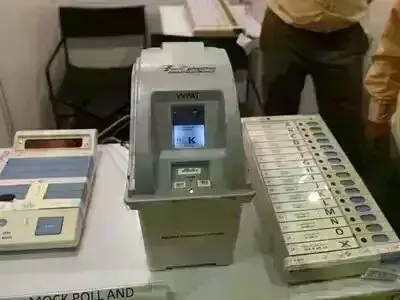Why are BJP leaders in BEL board that manufactures EVMs? Ex-civil officer questions ECI
He mentioned Mansukhbhai Shamjibhai Khachariya, one of the directors, whose affiliation as the BJP Rajkot district president, was openly displayed on the BEL website.

HYDERABAD: Former secretary to Government of India EAS Sarma has written a strongly worded letter to the Election Commission of India (ECI) raising serious concerns about the presence of BJP-affiliated directors on the board of Bharat Electronics Ltd (BEL) which is responsible for developing the software for Electronic Voting Machines (EVMs) used in Indian elections.
Sarma's letter highlighted how at least four individuals appointed as "independent" directors on the BEL board hold ties to the ruling BJP. He argues that this arrangement granted the BJP significant influence over BEL's operations, specifically its involvement in both manufacturing and supplying EVMs, including the development of the highly sensitive "secret" encrypted source code embedded within the machines' core chips.
Also Read: ECI bans exit polls in five states during elections
Despite previously bringing this issue to the ECI's attention, Sarma in his letter expressed disappointment that the ECI's lack of action potentially favoured the ruling BJP. He emphasised this point by specifically mentioning Mansukhbhai Shamjibhai Khachariya, one of the directors, whose affiliation as the BJP Rajkot district president was openly displayed on the BEL website.
Sarma questioned the ethics of placing such a prominent party official in such a crucial position within a company responsible for ensuring the integrity of elections, particularly given the growing concerns surrounding the reliability and potential manipulation of EVMs.
Beyond the issue of BJP influence, Sarma criticised several other decisions by the ECI
-Refusal to permit an independent audit of the EVM source code: Sarma argued that this lack of transparency fuelled public anxiety about the potential for tampering and manipulation of the machines.
-Rejection of cross-verification of EVM counts with paper ballots: This practice, according to Sarma, served as a crucial safeguard against potential discrepancies and manipulation, yet the ECI inexplicably refused its implementation.
-Failure to implement totalisers in EVMs: These devices, mandated by regulations, prevent the mixing of ballots between booths within a constituency, thereby bolstering voting secrecy. However, the ECI's continued use of EVMs without totalizers raised suspicions about their commitment to secure and transparent elections, Sarma said.
He also reminded the ECI of its authority under Article 324 of the Indian Constitution to intervene in such matters and its responsibility to uphold the integrity of the electoral process. He warned that further inaction would only erode public trust in the ECI and ultimately damage the future of Indian democracy.



